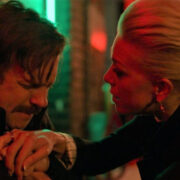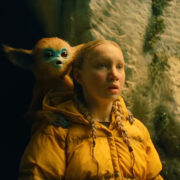Page To Screen: How JOJO RABBIT Fails To Adapt Anti-Fascism
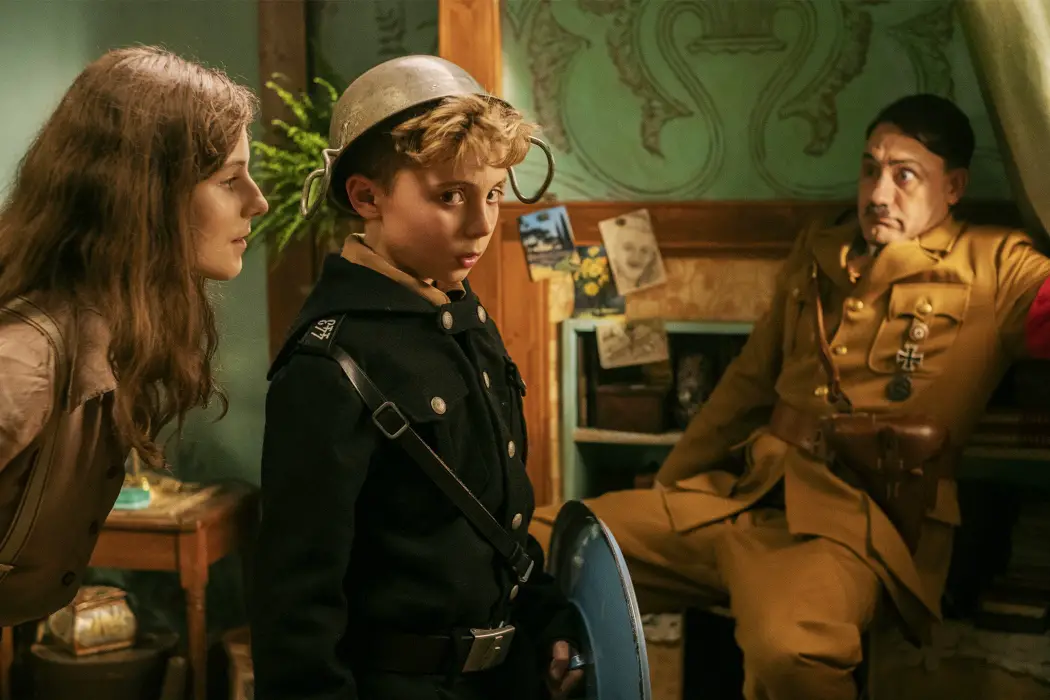
Josh is an Australian writer. He is an undergraduate at…
Page To Screen is a column examining literary adaptations in conversation with their source material. Call up your book club and set out some canapés, we’re talking reading.
Every few weeks a clip from Jojo Rabbit does the rounds on Twitter. If you have spent any amount of time on the platform, then you probably already know which clip I’m talking about. It’s taken from the final moments of the film, a shot-reverse-shot of former Nazi-youth member, Jojo (Roman Griffin Davis), and the Jewish girl who was hiding in his house, Elsa (Thomasin Mackenzie), dancing in the streets of their freshly liberated German town. Sound-tracking this scene is David Bowie’s “Heroes”; a pitch-perfect flourish from director Taika Waititi, a modern master of the anachronistic needle drop.
It’s immediately obvious why this clip is so popular. The dancing is an awkward mix of finger-snaps and arm flailing. Griffin Davis and Mackenzie wear goofy grins, they feel unself-conscious. It is, in a word, wholesome.
Add “Heroes” — a track that contrasts a triumphant sonic texture contrasts against bittersweet lyrics to tap into the universal feeling of locating optimism in a landscape of negativity — and you have the recipe for a feel-good moment. What could be better than two kids finding joy after living under Nazi rule, through World War II, and the Holocaust? The answer, of course, is nothing. The fantasy the scene sells is one we all want to buy into, who doesn’t want a happy ending?
But the scene is just that, a fantasy. The joy we’re being sold, while appealing, is superficial. Living in the 21st century, we know that Jojo and Elsa’s happiness will be short-lived. Soon the Iron Curtain will fall across Europe, Germany will become the staging ground for the Cold War, and its citizens (Jojo and Elsa included) will be pawns in a game of global politics that will last for 45-years.
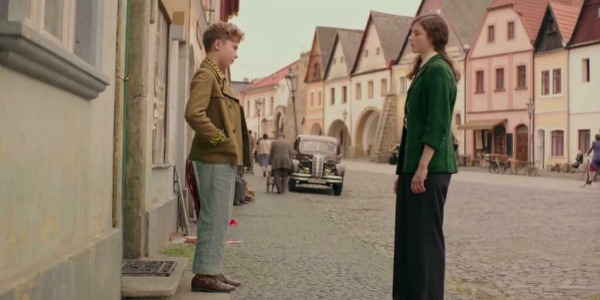
In making Jojo Rabbit, Waititi sought to poke “holes in Nazism and fascism”. The dancing scene is his concluding argument. Nazism, like all brands of fascism, gain power from control. By ending the film with dancing Waititi is suggesting that freedom of expression is the antidote. A nice sentiment, certainly, but also frustratingly platitudinal; if it were as easy to combat fascism and Nazism as Jojo Rabbit is suggesting then we wouldn’t have ongoing issues with hate groups who use their systems of oppression and tout their ideologies.
The kindest way of approaching Jojo Rabbit is as a work of historical revisionism. What if instead of meeting sadness and hate with more sadness and hate, we had met it with joy? But the film never really addresses that question. And even if it had we would still be left with the even larger question of what part of history was Waititi seeking to revise, and to what end?
A Loose Adaptation
Jojo Rabbit is an adaptation of the novel Caging Skies by Christine Leunens. The source material is a far dourer affair compared to the work it inspired.
Let’s start with the most conspicuous difference: the dance scene never happens.
Jojo never lets go of Nazi ideology, and he never tells Elsa the Allies won the war. Unable to reconcile his feelings for her and his Nazi beliefs he continues to lie to her, making her a prisoner in his house. A microscopic piece of the Third Reich endures beyond Hitler’s death through him. Eventually, Elsa does learn that the Allies won the war, but not before she spends years hostage to Jojo’s denial.
The message Leunens imparts is obvious. There is no easy undo to the damage wrought by a fascist ideology like Nazism. Jojo is as much of a hostage as Elsa. He can’t let go of Nazism because it supplanted every other aspect of his. It is cancer in the marrow of his character.
Leunens’ Jojo is a case study, “I needed to explore aspects of the era on psychological and logistical levels, such as how children were indoctrinated, what changes were brought about at school and at home, to try and grasp how such horrific events could have ever happened.” Implicit in this quote is the understanding that the specific breed of hatred that pervaded Nazi Germany did not occur naturally. Rather it was cultivated through a co-opting of every part of daily life; fascism promotes a total integration of state into one’s self.
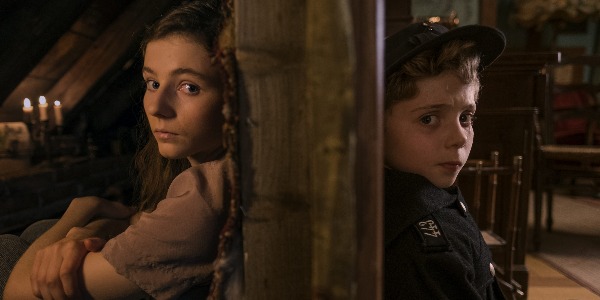
In Nazi Germany basic elements of daily life became inseparable from the Party: all regulation of infrastructure fell under their purview, the production and dispensing of food monitored, leisure and travel too were pulled into the system — relax and rest so when you return can better serve the Party. The family unit was reframed as an extension of Nazism, with bearing children the ultimate fealty to the führer; childhood was regulated by the Nazi Youth. Cinemas showed films that would reinforce Nazi values, propaganda films yes, but also Westerns, Action, and Adventure, anything that could spotlight how greatness was inherent to the nature of certain (Aryan) people, just as evil was inherent to the nature of the “undesirable other”. The insidiousness of fascism is not that it is hateful but that it makes hating mandatory.
Leunens poses the question of how do we break the circuitry of a fascist mindset; Nazism has infiltrated every part of Jojo’s life, so what does he have when it is suddenly excised? He has grief over his parents’ deaths, he has hate, and he has Elsa. Of course, he is going to push his feelings onto her, he doesn’t know what else he can do.
Caging Skies encapsulates the exact reason fascist groups are so hard to get rid of. They are insular, inviting participants into a reflexive culture: it is good to be a Nazi, says Nazism, because Nazism is good. Fascist culture is circular, once you fall into that circulation it is difficult to escape.
One only need look to the 2020 election for a modern example of this phenomenon, half of America believes the election is rigged. Trump says it was and it is good to believe Trump because Trump is good.
A culture where the culture itself has upheld as the infallible object forces all fault onto the individual. It is not that the Nazi Party rationed unrealistically late in the war; it is that the German citizen was too greedy. It is not that Trump betrayed America; it is that America betrayed Trump. Leunens’ Jojo is a victim of this process, incapable of faulting the institution that intentionally failed him, and only capable of taking failure into himself and pushing it onto Elsa.
A Very Loose Adaptation
What then was Waititi’s intention by adding the dance scene?
Midway through the film Jojo’s mother, Rosie (Scarlett Johansson), tells him, “Dancing is for people who are free!” So, Jojo and Elsa are freed by the film’s end, but again, freed from what?
“Freed from Nazi rule,” seems the obvious answer, because it is certainly not from the broader evil of fascism, in changing the ending Waititi adapted out that particular thematic thread. But the fascist nature of the Nazi Party is the most universal element of their villainy; the more idiosyncratic traits only carry over into our modern social climate if you squint, mixed a few metaphors, and push some square pegs into round holes. What Waititi is after is not the characteristics of Nazism, but the iconography, he wants the visual shorthand of the Gestapo and goosestepping and swastikas. The brand of evil depicted in Jojo Rabbit then can only be read as specific to Nazi Germany, but then that begs the question: what kind of threat does a Nazi actually represent to us today?
The answer, of course, is no threat at all.
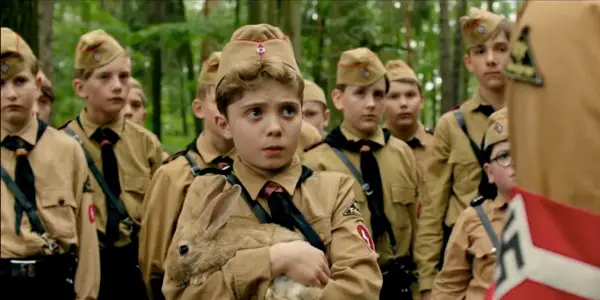
Tellingly Jojo Rabbit was billed as an “anti-hate satire”, not “anti-Nazi” or “anti-fascist”. As we are meant to understand it then, the specific evils that defined Nazism should be read analogously, not literally. But analogous to what exactly?
The term “hate” is too nonspecific. One person’s definition of a hate-group can range from something as relatively harmless as a conservative Church congregation to something as dangerous as the KKK, and the actions of each of those groups, how they express hate, ranges again.
Caging Skies is a poor fit for Waititi’s worldview. The outlook of the novel is directly opposed to his own. In adapting he had to remove Leunens’ nuance just to make the narrative compatible with his themes. Lacking the richness of the original text, he is instead reliant on broad and inaccurate statements to make his point.
When Elsa challenges Jojo about his belief’s she doesn’t try to disprove the foundations upon which his hateful ideology is propped, she doesn’t even accuse him of being hateful. She says, “You’re not a Nazi, Jojo, you’re a 10-year-old kid who likes dressing up in a funny uniform and wants to be part of a club.”
Is this statement meant to be read as historically contextual, or another analogy for our current moment? If it is the former then Waititi is implying that Nazis, the people who waged war on the free world and committed genocide, are little more than men playing dress-up. Alternatively, if we assume, he meant for it to be analogous, then Waititi is implying, through the broadness of his metaphor, that all types of hate directed at all types of people are effectively the same, which is blatantly untrue. The hatred of an online troll is not comparable to the collective hatred of one community toward another.
Reversing Jojo’s character arc shifts the focus from the hater to someone who might oppose it, individual cases like Jojo, Rosie, the gay Nazi Captain Klenzendork (Sam Rockwell), and his partner Finkel (Alfie Allen). There’s a certain “don’t judge a book by its cover” kind of messaging here, and Waititi’s positive ending implies that we should attempt to meet hate with love wherever possible. But whatever hope we’re meant to take away from this is undercut when you remember that most German citizens complied with the Nazi party, neither insurgence nor love toppled the Nazi Party, the Allies did. The fascist normalization of hatred prevented those living under it from successfully moving against it, and what is the value of a silent majority if they lack the tools to act?
Less an Adaptation; More “Takes Inspiration”
The effectiveness of Caging Skies rests in its focus, not on hatred, but on a specific type of social machinery that creates it. Leunens knew writing an anti-Nazi was reductive; Germany was a unique period in history. It is a cautionary novel, designed to equip readers to understand warning signs and prevent the spread of hateful thought. Because once hateful thought is ingrained, it is difficult to counteract.
Jojo Rabbit has no interest in the machinery of hate. It has no interest in specificity at all. It is simply opposed to hate as a concept. A noble opposition, certainly, but one so non-specific that it is effectively meaningless.
Nazis are easy targets, safe targets. Waititi doesn’t risk anything by making them the scapegoat, they have been history’s scapegoat for the better part of 90-years. If he wanted to satirize modern incarnations of hate, then a modern hate-group would have made for a more meaningful subject. The Nazi Party is a useless middleman. They confuse the film’s intentions, eliminating any punch Jojo Rabbit might have had.
Agree? Disagree? How did you interpret Jojo Rabbit? Share your thoughts in the comments!
Watch Jojo Rabbit
Does content like this matter to you?
Become a Member and support film journalism. Unlock access to all of Film Inquiry`s great articles. Join a community of like-minded readers who are passionate about cinema - get access to our private members Network, give back to independent filmmakers, and more.
Josh is an Australian writer. He is an undergraduate at the University of Wollongong, staff writer for Film Daze, and contributor for Film Inquiry. He once cried in Cats (2019), but that was an accident.


